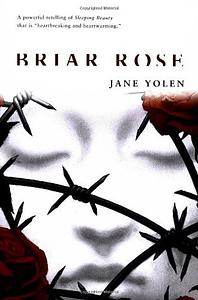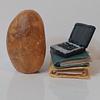Take a photo of a barcode or cover
This an awesome book. The fairy tale of Sleeping Beauty is blended with a holocaust story and they fit beautifully. It is a moving and mesmerising book as you wait to find out what really happened to Gemma. I definitely recommend this one.
This was a haunting book. Interesting read. Not sure I'd read it again.
His voice had a wonderful flow to it, and even the awful things he had to say were beautifully said." This book in a nutshell.
It blew me away. You cannot "enjoy" a book about the Holocaust; that's not the right word, not least because even though the characters are fictional, the horror of their stories is not. However, the juxtaposition of those stories with the fairy tale of Sleeping Beauty creates a heart-rending, gut-punching, thought-provoking, powerfully meaningful and relatable MASTERPIECE. I often had to put the book down, breathe, and work through what I just read. I had to walk away between scenes in the last half of the book because it was so difficult, so intense to experience. The way Jane Yolen uses the tale of Sleeping Beauty as a way for Gemma to reconcile her past, the role the tale plays in the characters' lives, how different characters hear and interpret it differently, how their expectations for it differ and what those reactions mean in relation to Gemma's past...wow. Just wow. This book is truly in a league of its own.
It blew me away. You cannot "enjoy" a book about the Holocaust; that's not the right word, not least because even though the characters are fictional, the horror of their stories is not. However, the juxtaposition of those stories with the fairy tale of Sleeping Beauty creates a heart-rending, gut-punching, thought-provoking, powerfully meaningful and relatable MASTERPIECE. I often had to put the book down, breathe, and work through what I just read. I had to walk away between scenes in the last half of the book because it was so difficult, so intense to experience. The way Jane Yolen uses the tale of Sleeping Beauty as a way for Gemma to reconcile her past, the role the tale plays in the characters' lives, how different characters hear and interpret it differently, how their expectations for it differ and what those reactions mean in relation to Gemma's past...wow. Just wow. This book is truly in a league of its own.
I really wanted to like this book since I love the fairy tale of Sleeping Beauty and I also love WW2 historical fiction. Disappointed with the writing, with Becca's character, and with the questionable content. I was also hoping for a more realistic story of Gemma's holocaust survival.
This is the tale of a young woman serching for her past. When Becca's grandmother died, she realized that not only did she know nothing about her own grandmother, but no one else in the family knew anything either. So, Becca goes on a quest to learn more, and as her investigation goes on, she finds out many surprising things about her family's past.
Overall an interesting story filled with historical references. There were a few problems here and there. For example, it's obvious that the author is not a German speaker based on the phrases used in the book. In an case, I still recommend it for those who want a harrowing journey with a happy ending.
Overall an interesting story filled with historical references. There were a few problems here and there. For example, it's obvious that the author is not a German speaker based on the phrases used in the book. In an case, I still recommend it for those who want a harrowing journey with a happy ending.
I finished this book in one sitting. It was a heartbreaking, heartwarming, eye opening, hauntingly romantic read. I highly recommend it.
I've always loved Jane Yolen's books, and this one is no exception. I've looked for it for a long time. Now to finally own a copy makes me extremely happy,
Recently, author Jane Yolen posted a link on facebook, for a Catholic readers' blog, where an anonymous person had posted a limerick response to her book Briar Rose. The limerick went as follows:
Jane's book left me so dismayed,
She's certainly drunk the Kool-Aid.
The bias is clear,
The agenda is dear,
To the heart of a liberal Crusade.
The rating attached to Yolen's book is "DaVinci Pile", which the web site defines as follows:
"DaVinci Pile: The fun read is not worth the damage done.
These do not pass my muster due to: adult themes, occult themes, excessively bad language, sexual content or innuendo, blatant bias, slanted historical references, or other failures as noted by reviewer (me)."
Just to paint a clearer picture of this particular blog, http://booksnblather.blogspot.com/, it bills its content as "Reviews to help Catholic parents find good books and safe navigation on the ocean of pop literature." They also feature the following quote: "Never read books you aren't sure about . . . even supposing that these bad books are very well written from a literary point of view. Let me ask you this: Would you drink something you knew was poisoned just because it was offered to you in a golden cup?"
Needless to say, I felt compelled to a limerick in response to the one above, and a review of Briar Rose, which I attempted to post to the web site last week. To date, my review and accompanying limerick have not been added to the blog. So, I am putting it up right here on Goodreads, without fear of bigotry or censorship! Here it is:
Oh how fun, a "review" in limerick form! Except, this particular limerick doesn't make any effort to show or prove any particular point. What Kool-Aid is being referred to? Which bias, and toward what view point? How is this book representative of a liberal crusade? Let me offer my own take.
First off, a limerick:
In the mood for a book that's well-written?
Not concerned with how politics fit in?
Try Yolen's Briar Rose,
And see how it goes,
With her fine-honed prose you'll be smitten.
Now, an actual review:
I read this book for the first time a few months ago, and was struck by the clear prose, and the binary storyline which revealed itself inch by inch, as part of an unwinding double tapestry of pain intermingled with hope. That is to say, Yolen follows two storylines simultaneously, at an un-rushed pace.
One is that of a young woman reporter who is trying to track down her grandmother's history; the second is that of the grandmother as a young woman. The grandmother happens to be a survivor of the holocaust, with its attendant horrors and failings of humanity. However, sparks of real human goodness and love (in both women's lives) are revealed and nurtured into flames.
I was grateful for Yolen's steady pace; when dealing with this kind of subject matter, it is hard to take too much at a time, and one needs the balm of human empathy (even in literary form) to balance the horror of what people are willing to perpetrate against others. There is, among some writers, a temptation to pour forth the horror in a fast red gush, but I don't feel our understanding is enhanced by being hurriedly and luridly brutalized.
I could add more, but I don't want to add "spoiler" content for those who haven't had the chance to read this excellent book. For those with a mere prurient interest in violence and gore, Briar Rose will prove unsatisfying. I highly recommend it, and feel that it is appropriate for teen readers, and those who want to learn more about the holocaust from both a historical and humanistic viewpoint.
Jane's book left me so dismayed,
She's certainly drunk the Kool-Aid.
The bias is clear,
The agenda is dear,
To the heart of a liberal Crusade.
The rating attached to Yolen's book is "DaVinci Pile", which the web site defines as follows:
"DaVinci Pile: The fun read is not worth the damage done.
These do not pass my muster due to: adult themes, occult themes, excessively bad language, sexual content or innuendo, blatant bias, slanted historical references, or other failures as noted by reviewer (me)."
Just to paint a clearer picture of this particular blog, http://booksnblather.blogspot.com/, it bills its content as "Reviews to help Catholic parents find good books and safe navigation on the ocean of pop literature." They also feature the following quote: "Never read books you aren't sure about . . . even supposing that these bad books are very well written from a literary point of view. Let me ask you this: Would you drink something you knew was poisoned just because it was offered to you in a golden cup?"
Needless to say, I felt compelled to a limerick in response to the one above, and a review of Briar Rose, which I attempted to post to the web site last week. To date, my review and accompanying limerick have not been added to the blog. So, I am putting it up right here on Goodreads, without fear of bigotry or censorship! Here it is:
Oh how fun, a "review" in limerick form! Except, this particular limerick doesn't make any effort to show or prove any particular point. What Kool-Aid is being referred to? Which bias, and toward what view point? How is this book representative of a liberal crusade? Let me offer my own take.
First off, a limerick:
In the mood for a book that's well-written?
Not concerned with how politics fit in?
Try Yolen's Briar Rose,
And see how it goes,
With her fine-honed prose you'll be smitten.
Now, an actual review:
I read this book for the first time a few months ago, and was struck by the clear prose, and the binary storyline which revealed itself inch by inch, as part of an unwinding double tapestry of pain intermingled with hope. That is to say, Yolen follows two storylines simultaneously, at an un-rushed pace.
One is that of a young woman reporter who is trying to track down her grandmother's history; the second is that of the grandmother as a young woman. The grandmother happens to be a survivor of the holocaust, with its attendant horrors and failings of humanity. However, sparks of real human goodness and love (in both women's lives) are revealed and nurtured into flames.
I was grateful for Yolen's steady pace; when dealing with this kind of subject matter, it is hard to take too much at a time, and one needs the balm of human empathy (even in literary form) to balance the horror of what people are willing to perpetrate against others. There is, among some writers, a temptation to pour forth the horror in a fast red gush, but I don't feel our understanding is enhanced by being hurriedly and luridly brutalized.
I could add more, but I don't want to add "spoiler" content for those who haven't had the chance to read this excellent book. For those with a mere prurient interest in violence and gore, Briar Rose will prove unsatisfying. I highly recommend it, and feel that it is appropriate for teen readers, and those who want to learn more about the holocaust from both a historical and humanistic viewpoint.
WARNING This book is about a young Jewish woman who goes to Europe to find out about her grandmother, who was a Holocaust survivor. The book gets quite gruesome, and some of this is touched on below.
----||----
I started reading this one a little at a time, because that was the opportunity I was allowing myself, and got dragged in about halfway through and finished it all in a rush.
The story starts with the grandmother of the story, Gemma, being asked to tell the fairy tale of Sleeping Beauty/Briar Rose to her three grand-daughters - the practical older sisters Shana and Sylvia, and the more willing to believe Rebecca. The telling of the tale is scattered through out the book, in snippets, along with little details of the family life as it had been, and the interactions between the sisters, and between grandmother and grand-daughters.
This is interspersed with the 'modern day' section of the story, which starts with the three young women coming to say goodbye Gemma, and follows through the funeral, and so forth. Fairly prosaic story line, sparingly used to develop further the characters of the sisters, and to pave the way for where the story goes.
After the funeral, and the well-wishers have gone home, Gemma's treasure box is opened, and found to contain an assortment of bits and pieces - entry papers for the US, newspaper cuttings, other pieces - with little to link them. 'Becca becomes caught up with the 'need' to know what it all means, which leads to her travelling to Poland, and trying to track down where her grandmother had come from, any of her story.
The initial section in Poland is the weakest of the book - the characterisation is less believable, and the coincidences that lead to Becca, and her Polish guide Magda, meeting with the one person who can tell them what happened were a bit much for me.
However, this is followed by another story within a story, that of the wartime experiences of Josef Potocki, one time 'internment camp' inmate, escapee and resistance member. The story is harrowing at times, far more detailed than I wanted, although a part of me suspects that it was much less than it could have been.
When I go back and look at how much of the book is taken up by the story that Josef tells, I am surprised at how little there actually is - in my mind it has taken over the rest of the story, which is sad, because much of the rest has as much meaning, as much to say as this section. There is not as much horror in the interactions between the sisters, but there is much potential for pathos, for exploration, and this is there, in the story, it is just that it has not had the impact. Which, on one hand, means that that section of the story has come across, but on the other hand, the importance of being a survivor, not a victim, of living a full life, which I have found stressed in other works about the Holocaust, didn't come across in the same way. And I wonder if that is a lack in the text, or a lack in the reader
----||----
I started reading this one a little at a time, because that was the opportunity I was allowing myself, and got dragged in about halfway through and finished it all in a rush.
The story starts with the grandmother of the story, Gemma, being asked to tell the fairy tale of Sleeping Beauty/Briar Rose to her three grand-daughters - the practical older sisters Shana and Sylvia, and the more willing to believe Rebecca. The telling of the tale is scattered through out the book, in snippets, along with little details of the family life as it had been, and the interactions between the sisters, and between grandmother and grand-daughters.
This is interspersed with the 'modern day' section of the story, which starts with the three young women coming to say goodbye Gemma, and follows through the funeral, and so forth. Fairly prosaic story line, sparingly used to develop further the characters of the sisters, and to pave the way for where the story goes.
After the funeral, and the well-wishers have gone home, Gemma's treasure box is opened, and found to contain an assortment of bits and pieces - entry papers for the US, newspaper cuttings, other pieces - with little to link them. 'Becca becomes caught up with the 'need' to know what it all means, which leads to her travelling to Poland, and trying to track down where her grandmother had come from, any of her story.
The initial section in Poland is the weakest of the book - the characterisation is less believable, and the coincidences that lead to Becca, and her Polish guide Magda, meeting with the one person who can tell them what happened were a bit much for me.
However, this is followed by another story within a story, that of the wartime experiences of Josef Potocki, one time 'internment camp' inmate, escapee and resistance member. The story is harrowing at times, far more detailed than I wanted, although a part of me suspects that it was much less than it could have been.
When I go back and look at how much of the book is taken up by the story that Josef tells, I am surprised at how little there actually is - in my mind it has taken over the rest of the story, which is sad, because much of the rest has as much meaning, as much to say as this section. There is not as much horror in the interactions between the sisters, but there is much potential for pathos, for exploration, and this is there, in the story, it is just that it has not had the impact. Which, on one hand, means that that section of the story has come across, but on the other hand, the importance of being a survivor, not a victim, of living a full life, which I have found stressed in other works about the Holocaust, didn't come across in the same way. And I wonder if that is a lack in the text, or a lack in the reader




